北师大版(2019)选择性必修第三册UNIT8 Literature LESSON 2Poetry教学课件(共26张PPT)
文档属性
| 名称 | 北师大版(2019)选择性必修第三册UNIT8 Literature LESSON 2Poetry教学课件(共26张PPT) | 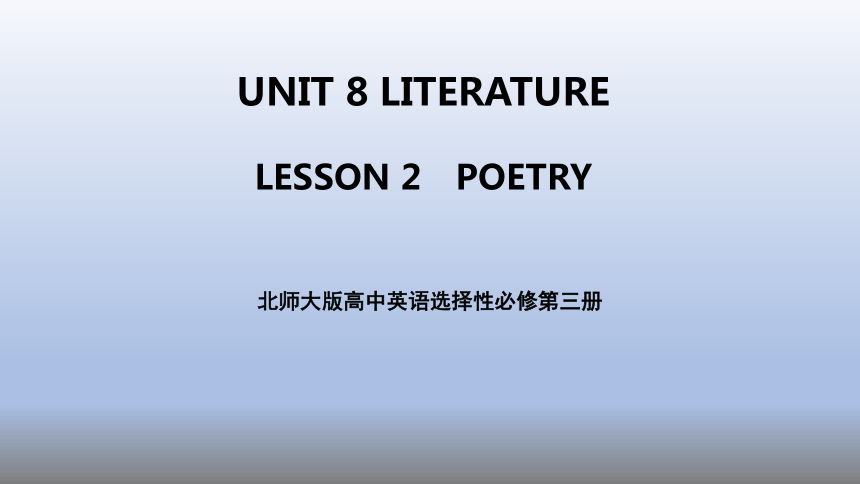 | |
| 格式 | pptx | ||
| 文件大小 | 106.1KB | ||
| 资源类型 | 教案 | ||
| 版本资源 | 北师大版(2019) | ||
| 科目 | 英语 | ||
| 更新时间 | 2023-05-05 22:38:17 | ||
图片预览

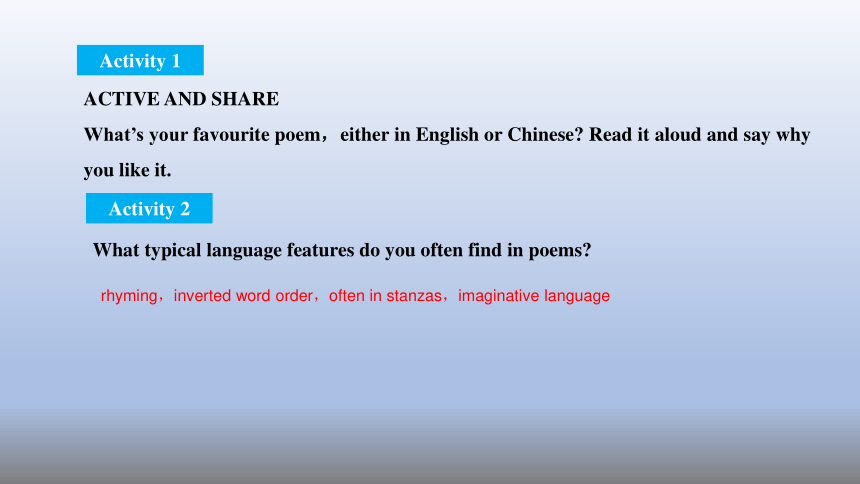
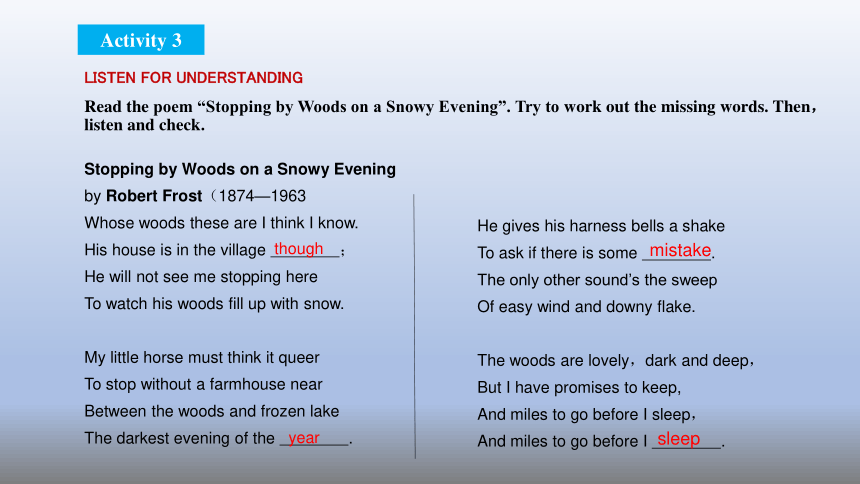
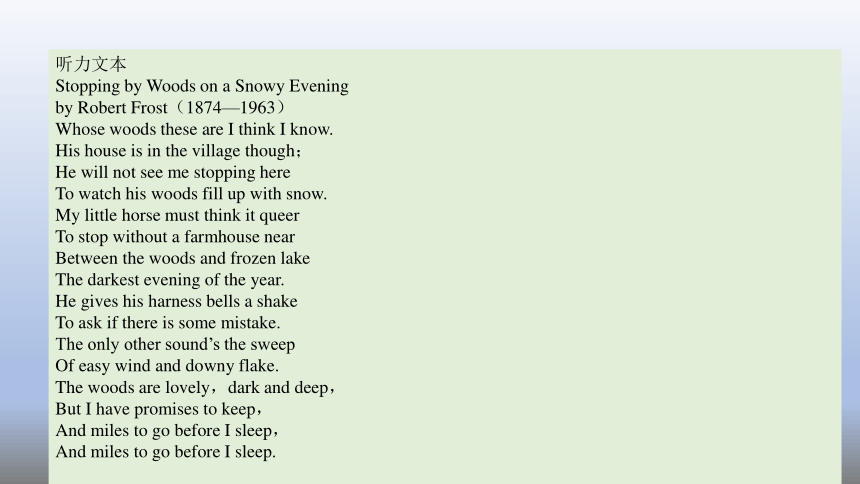
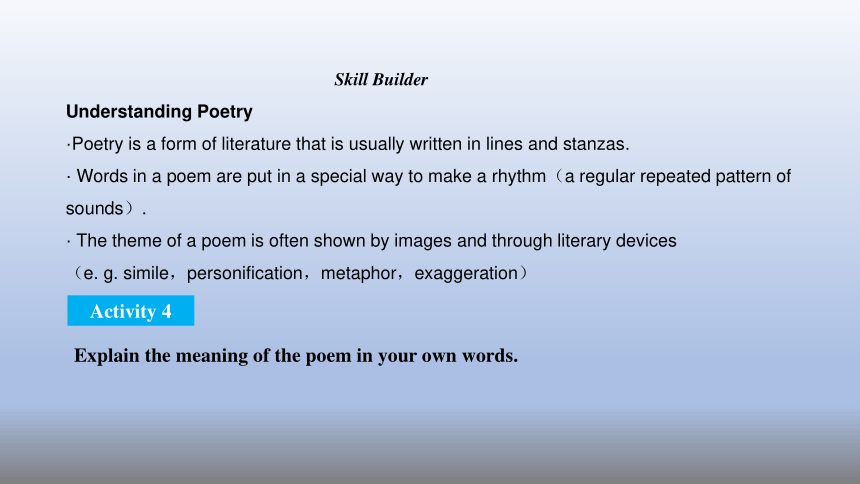
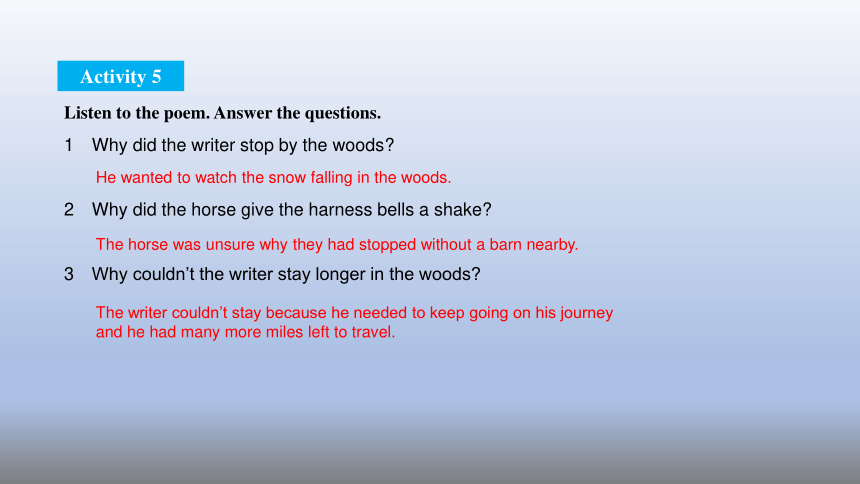
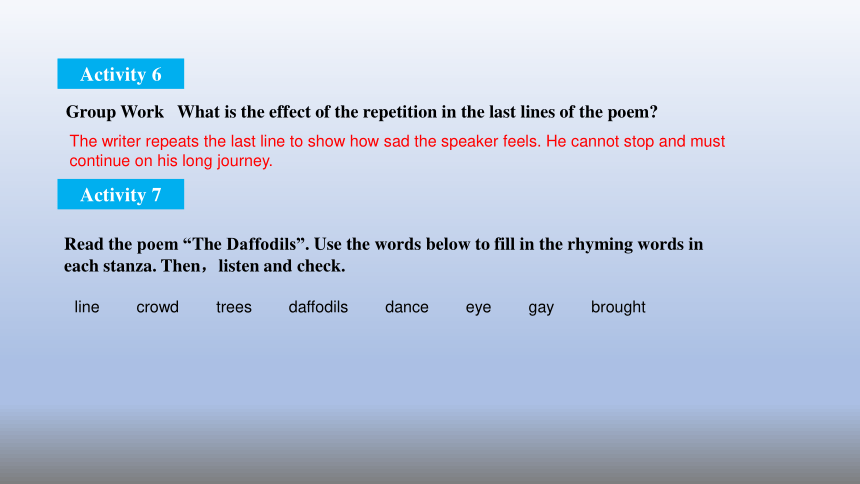
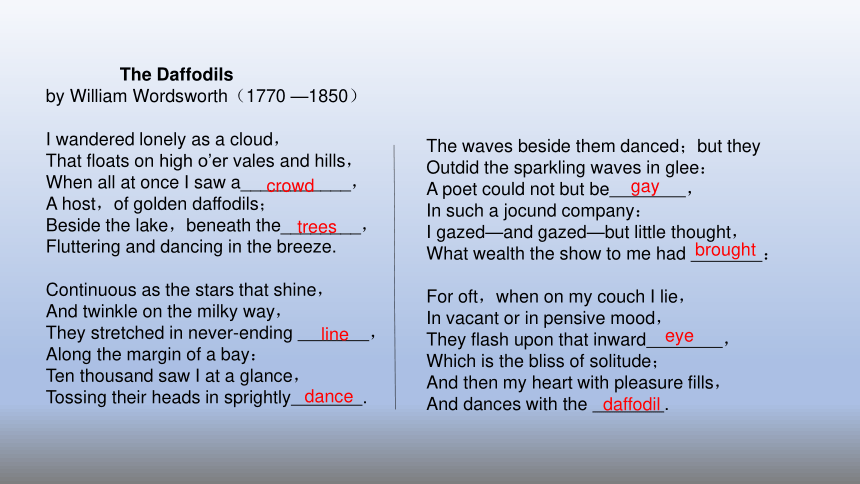
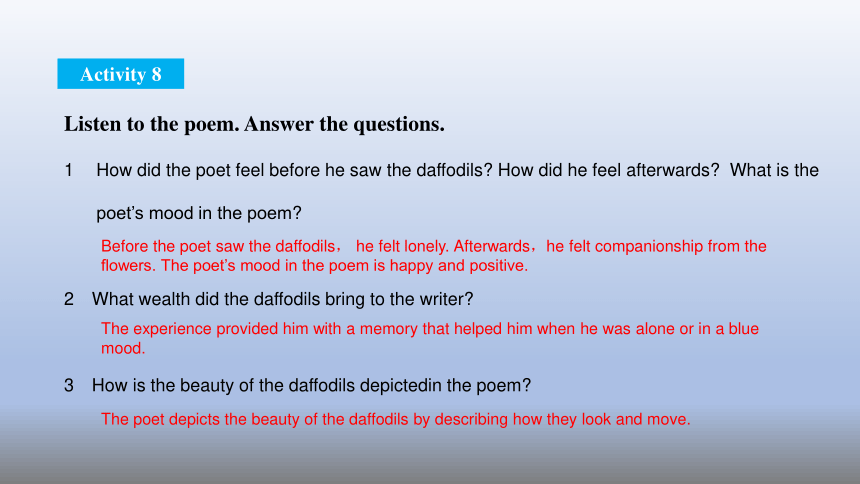
文档简介
(共26张PPT)
UNIT 8 LITERATURE
LESSON 2 POETRY
北师大版高中英语选择性必修第三册
ACTIVE AND SHARE
What’s your favourite poem,either in English or Chinese Read it aloud and say why you like it.
Activity 1
What typical language features do you often find in poems
Activity 2
rhyming,inverted word order,often in stanzas,imaginative language
Read the poem “Stopping by Woods on a Snowy Evening”. Try to work out the missing words. Then,listen and check.
Activity 3
LISTEN FOR UNDERSTANDING
Stopping by Woods on a Snowy Evening
by Robert Frost(1874—1963
Whose woods these are I think I know.
His house is in the village ;
He will not see me stopping here
To watch his woods fill up with snow.
My little horse must think it queer
To stop without a farmhouse near
Between the woods and frozen lake
The darkest evening of the .
He gives his harness bells a shake
To ask if there is some .
The only other sound’s the sweep
Of easy wind and downy flake.
The woods are lovely,dark and deep,
But I have promises to keep,
And miles to go before I sleep,
And miles to go before I .
sleep
though
year
mistake
听力文本
Stopping by Woods on a Snowy Evening
by Robert Frost(1874—1963)
Whose woods these are I think I know.
His house is in the village though;
He will not see me stopping here
To watch his woods fill up with snow.
My little horse must think it queer
To stop without a farmhouse near
Between the woods and frozen lake
The darkest evening of the year.
He gives his harness bells a shake
To ask if there is some mistake.
The only other sound’s the sweep
Of easy wind and downy flake.
The woods are lovely,dark and deep,
But I have promises to keep,
And miles to go before I sleep,
And miles to go before I sleep.
Skill Builder
Understanding Poetry
·Poetry is a form of literature that is usually written in lines and stanzas.
· Words in a poem are put in a special way to make a rhythm(a regular repeated pattern of sounds).
· The theme of a poem is often shown by images and through literary devices
(e. g. simile,personification,metaphor,exaggeration)
Activity 4
Explain the meaning of the poem in your own words.
Listen to the poem. Answer the questions.
1 Why did the writer stop by the woods
2 Why did the horse give the harness bells a shake
3 Why couldn’t the writer stay longer in the woods
Activity 5
The writer couldn’t stay because he needed to keep going on his journey and he had many more miles left to travel.
He wanted to watch the snow falling in the woods.
The horse was unsure why they had stopped without a barn nearby.
Group Work What is the effect of the repetition in the last lines of the poem
Activity 6
The writer repeats the last line to show how sad the speaker feels. He cannot stop and must continue on his long journey.
Activity 7
Read the poem “The Daffodils”. Use the words below to fill in the rhyming words in each stanza. Then,listen and check.
line crowd trees daffodils dance eye gay brought
The Daffodils
by William Wordsworth(1770 —1850)
I wandered lonely as a cloud,
That floats on high o’er vales and hills,
When all at once I saw a___________,
A host,of golden daffodils;
Beside the lake,beneath the________,
Fluttering and dancing in the breeze.
Continuous as the stars that shine,
And twinkle on the milky way,
They stretched in never-ending ,
Along the margin of a bay:
Ten thousand saw I at a glance,
Tossing their heads in sprightly .
The waves beside them danced;but they
Outdid the sparkling waves in glee:
A poet could not but be ,
In such a jocund company:
I gazed—and gazed—but little thought,
What wealth the show to me had :
For oft,when on my couch I lie,
In vacant or in pensive mood,
They flash upon that inward ,
Which is the bliss of solitude;
And then my heart with pleasure fills,
And dances with the .
daffodil
crowd
trees
line
dance
gay
brought
eye
Listen to the poem. Answer the questions.
How did the poet feel before he saw the daffodils How did he feel afterwards What is the poet’s mood in the poem
2 What wealth did the daffodils bring to the writer
3 How is the beauty of the daffodils depictedin the poem
Activity 8
The poet depicts the beauty of the daffodils by describing how they look and move.
Before the poet saw the daffodils, he felt lonely. Afterwards,he felt companionship from the flowers. The poet’s mood in the poem is happy and positive.
The experience provided him with a memory that helped him when he was alone or in a blue mood.
听力文本
The Daffodils
by William Wordsworth(1770—1850)
I wandered lonely as a cloud,
That floats on high o’er vales and hills,
When all at once I saw a crowd,
A host,of golden daffodils;
Beside the lake,beneath the trees,
Fluttering and dancing in the breeze.
Continuous as the stars that shine,
And twinkle on the milky way,
They stretched in never-ending line,
Along the margin of a bay:
Ten thousand saw I at a glance,
Tossing their heads in sprightly dance.
The waves beside them danced;but they
Outdid the sparkling waves in glee:
A poet could not but be gay,
In such a jocund company:
I gazed—and gazed—but little thought,
What wealth the show to me had brought:
For oft,when on my couch I lie,
In vacant or in pensive mood,
They flash upon that inward eye,
Which is the bliss of solitude;
And then my heart with pleasure fills,
And dances with the daffodils.
Listen to the two poems again. Read them aloud.
Activity 9
Read the two poems again. Underline and talk about the literary devices the two poets used to express their feelings.
Activity 10
Evening
personification—He gives his harness bells a shake
alliteration—The woods are lovely, dark and deep
repetition—And miles to go before I sleep
The Daffodils
alliteration—Beside the lake,beneath the trees
simile—I wandered lonely as a cloud
personification—Fluttering and dancing in the breeze
exaggeration—Continuous as the stars that shine
Group Work Both Robert Frost and William Wordsworth expressed their deep love and appreciation of nature in their poems. Discuss the different ways they expressed their appreciation. Find examples.
Activity 11
Stopping by Woods on a Snowy Evening
The poet describes the whole scene of the woods on a snowy evening vividly. He used the scene as background to show what he thinks and how his thought changes after he sees the scene.
The Daffodils
The writer is cheerful with recalling the beautiful sights. In the poem,on the beauty of nature,the reader is presented a vivid picture of lively daffodils. The poet uses the description of daffodils to show his philosophical thoughts.
Activity 12
Write a short poem,expressing your love or appreciation of something. Read it aloud to the class.
Language points
核心词汇
教材原句p.34 Between the woods and frozen lake 寒林和冰湖之间
1 frozen adj.
(1)(河,湖等)结冰的;冷冻的;冷藏的
It is quite an adventure to slip on the frozen river over and over again.
在结冰的河上一次又一次地滑倒真是一场冒险。[词汇复现]
The chef doesn’t like the frozen food because it doesn’t taste so delicious.
这位厨师不喜欢冷冻食品,因为它尝起来不那么美味。[词汇复现]
(2)吓呆的;惊呆的
搭配:frozen with/in sth
Mary was frozen with fear. 玛丽吓呆了。
【词语积累】
freeze vt. & vi.(使)结冰;(使)(液体)凝固;冷藏;吓呆
freezing adj. 极冷的 freezer n. 冷冻柜;冰柜;冷藏箱
The river freezes in winter. 冬天河水会结冰。
It seemed as if time had frozen. 时间仿佛凝固了。
It is absolutely freezing outside. 外面绝对冷极了。
题组练·领悟方法
单句语法填空
(1) If I am busy,I will buy some (freeze)food to eat.
(2) The meat must be stored below (freeze)temperature.
(3)[词汇复现]The poor saleswoman was nearly (freeze)to death on a winter evening.
完成句子
(4) He stood rooted to the spot, (吓呆了).
(5) Because of lack of snow and (结冰的地面),birds are able to seek food in fields and forests for their natural food.
(6) The poor cat (冻死) in the street.
frozen
freezing
frozen
frozen with fear
frozen ground
was frozen to death
教材原句p.34 The only other sound’s the sweep 此外只有轻风拂雪片,
Of easy wind and downy flake. 再也听不见其他声音。
2 sweep n. & v.
(1)n. 扫;打扫
Give the room a good sweep. 好好打扫一下这个房间。
(2)vt. & vi. 扫,打扫;扫去;卷走,冲走
搭配 sweep up 打扫,清扫
sweep away 扫除;刮走;冲走;消灭;彻底消除
Jane is sweeping up the bits of paper and broken glass. 简在清扫纸屑和碎玻璃。
Some old customs should be swept away. 一些旧的习俗应该被清除。
【误区警示】
sweep 的过去式和过去分词分别为:swept,swept
单句语法填空
(1)[词汇复现]He and three other assistants were left to sweep after the party. (2) The wind swept the leaves ,and the road was clean.
完成句子
(3) In China,people believe fire can (消除)bad luck,so,red means good luck.
(4) They were hired to (打扫)after office hours.
(5) He gave the house (彻底打扫).
up
away
sweep away
sweep up
a thorough sweep
教材原句p.35 I wandered lonely as a cloud...
独行徐徐如浮云……
3 wander vi. & vt. 徘徊,闲逛;漫步于;走神
wander around 徘徊
搭配 wander from 从……离开
wander off 偏离(正道);走失;离散
Many customers like wandering around the mall. 很多消费者喜欢在商场里闲逛。[词汇复现]
He was found wandering the streets of New York. 有人看到他在纽约街头游荡。
【学法点拨】
wonder vi. 想知道,感到疑惑
I have been wondering why so many people like wandering around the supermarket aimlessly.
我一直不明白为什么那么多人喜欢在超市里漫无目的地闲逛。
单句语法填空
(1) Henry (wander)along the pavement when someone invited him to a big house.
(2) When the children left home,she was used to wandering the house as if she’d lost something.
(3) Bob was controlling his mind not to wander his work.
(4) The boy wandered and got lost.
was wandering
around
from
off
教材原句p.35 Continuous as the stars that shine,有如群星在银河,
And twinkle on the milky way, 形影绵绵光灼灼。
4 continuous adj. 持续的,不间断的,连续的
a continuous flow of water/cars汩汩流水 /川流不息的车辆
continuous changes不断的变化
the continuous rain连绵不断的雨
continuous improvement持续改进;进取不懈
a continuous process一个连续的过程
The brain needs a continuous supply of blood. 大脑需要连续不断的血液供给。
The continuous work made him thoroughly exhausted. 不间断的工作使他精疲力竭。
We must be continuous to study. 我们必须不断地学习。
【词语积累】 continue vt. & vi.(使)继续;接着做;继续前行
to be continued 未完待续c ontinuously adv. 连续地;不断地
Mr Lee continued to work on the book during his long illness. 李先生在长期患病期间继续写那本书。
单句语法填空
(1) Connolly first came to China in 1987,starting his (continue)travelling throughout China.
(2) The second part is (continue) on the next page.
(3)We must (continuous) study to adapt to the development of times.
完成句子
(4) Once started,it is of course (一个连续的过程).
(5)[词汇复现]Thanks to your help,I have (取得了持续不断的进步)in maths,and finally made up my mind to study it in the university.
(6) (这连绵不断的雨) is likely to ruin the crops.
(7) They’ve had (持续三年的增长)in production,so things must be going well.
continuous
to be continued
continuously
a continuous process
made continuous progress
The continuous rain
a continuous three-year rise
教材原句p.35 They stretched in never-ending line...
……它们连成一线无断续。
5 stretch vi. & vt. 延伸,绵延;(使)变大;(使)变松;拉长
搭配 stretch for miles 延伸数英里
stretch out 躺下(睡觉或休息);伸出,伸开(手、脚等)
The sea stretches as far as the horizon and beyond.
大海一直延伸到地平线以外。
My brother stretched out his arms and hugged me tightly.
我哥哥伸出双臂,紧紧地拥抱我。
单句语法填空
(1) The park is very big and (stretch) for several miles.
(2) The moment the little girl saw the toy,she stretched her hands for it.
(3) The forest stretches hundreds of miles.
stretches
out
for
教材原句p.35 The waves beside them danced...
……湖波踊跃无花乐。
6 wave n. & v.
(1)n. 海浪,波涛;(行为、活动或感情的)一阵,风潮;挥手;招手; 摆手
a huge wave一个大浪
in the waves在波浪中
a wave of一阵……
give sb a wave朝某人挥手
greet sb with a wave挥手和某人打招呼
(2)vi. & vt. 挥动,摆动;挥手
wave sb goodbye = wave goodbye to sb 与某人挥手告别
wave away 对……置之不理;不理会
wave at/to 朝……挥手
He waved goodbye to his client and set out for another destination.
他向他的客户挥手告别,出发去另一个目的地。[词汇复现]
搭配
单句语法填空
(1) He waved my offer of a cigarette.
(2) Marin stood at the top of the hill, (wave)his arms excitedly.
(3) When I waved goodbye my grandma,I couldn’t help crying.
(4) The president waved the crowd from the steps of the plane.
完成句子
(5)[词汇复现] (一阵恐惧)swept over him.
(6) He (朝……挥手) his grandparents and went back home to study after the Spring Festival.
(7)[词汇复现]All the audience greeted the specialist (挥手)at his presence.
away
waving
to
at/to
A wave of fear
gave a wave to 或waved at/to
with a wave
Thank you
UNIT 8 LITERATURE
LESSON 2 POETRY
北师大版高中英语选择性必修第三册
ACTIVE AND SHARE
What’s your favourite poem,either in English or Chinese Read it aloud and say why you like it.
Activity 1
What typical language features do you often find in poems
Activity 2
rhyming,inverted word order,often in stanzas,imaginative language
Read the poem “Stopping by Woods on a Snowy Evening”. Try to work out the missing words. Then,listen and check.
Activity 3
LISTEN FOR UNDERSTANDING
Stopping by Woods on a Snowy Evening
by Robert Frost(1874—1963
Whose woods these are I think I know.
His house is in the village ;
He will not see me stopping here
To watch his woods fill up with snow.
My little horse must think it queer
To stop without a farmhouse near
Between the woods and frozen lake
The darkest evening of the .
He gives his harness bells a shake
To ask if there is some .
The only other sound’s the sweep
Of easy wind and downy flake.
The woods are lovely,dark and deep,
But I have promises to keep,
And miles to go before I sleep,
And miles to go before I .
sleep
though
year
mistake
听力文本
Stopping by Woods on a Snowy Evening
by Robert Frost(1874—1963)
Whose woods these are I think I know.
His house is in the village though;
He will not see me stopping here
To watch his woods fill up with snow.
My little horse must think it queer
To stop without a farmhouse near
Between the woods and frozen lake
The darkest evening of the year.
He gives his harness bells a shake
To ask if there is some mistake.
The only other sound’s the sweep
Of easy wind and downy flake.
The woods are lovely,dark and deep,
But I have promises to keep,
And miles to go before I sleep,
And miles to go before I sleep.
Skill Builder
Understanding Poetry
·Poetry is a form of literature that is usually written in lines and stanzas.
· Words in a poem are put in a special way to make a rhythm(a regular repeated pattern of sounds).
· The theme of a poem is often shown by images and through literary devices
(e. g. simile,personification,metaphor,exaggeration)
Activity 4
Explain the meaning of the poem in your own words.
Listen to the poem. Answer the questions.
1 Why did the writer stop by the woods
2 Why did the horse give the harness bells a shake
3 Why couldn’t the writer stay longer in the woods
Activity 5
The writer couldn’t stay because he needed to keep going on his journey and he had many more miles left to travel.
He wanted to watch the snow falling in the woods.
The horse was unsure why they had stopped without a barn nearby.
Group Work What is the effect of the repetition in the last lines of the poem
Activity 6
The writer repeats the last line to show how sad the speaker feels. He cannot stop and must continue on his long journey.
Activity 7
Read the poem “The Daffodils”. Use the words below to fill in the rhyming words in each stanza. Then,listen and check.
line crowd trees daffodils dance eye gay brought
The Daffodils
by William Wordsworth(1770 —1850)
I wandered lonely as a cloud,
That floats on high o’er vales and hills,
When all at once I saw a___________,
A host,of golden daffodils;
Beside the lake,beneath the________,
Fluttering and dancing in the breeze.
Continuous as the stars that shine,
And twinkle on the milky way,
They stretched in never-ending ,
Along the margin of a bay:
Ten thousand saw I at a glance,
Tossing their heads in sprightly .
The waves beside them danced;but they
Outdid the sparkling waves in glee:
A poet could not but be ,
In such a jocund company:
I gazed—and gazed—but little thought,
What wealth the show to me had :
For oft,when on my couch I lie,
In vacant or in pensive mood,
They flash upon that inward ,
Which is the bliss of solitude;
And then my heart with pleasure fills,
And dances with the .
daffodil
crowd
trees
line
dance
gay
brought
eye
Listen to the poem. Answer the questions.
How did the poet feel before he saw the daffodils How did he feel afterwards What is the poet’s mood in the poem
2 What wealth did the daffodils bring to the writer
3 How is the beauty of the daffodils depictedin the poem
Activity 8
The poet depicts the beauty of the daffodils by describing how they look and move.
Before the poet saw the daffodils, he felt lonely. Afterwards,he felt companionship from the flowers. The poet’s mood in the poem is happy and positive.
The experience provided him with a memory that helped him when he was alone or in a blue mood.
听力文本
The Daffodils
by William Wordsworth(1770—1850)
I wandered lonely as a cloud,
That floats on high o’er vales and hills,
When all at once I saw a crowd,
A host,of golden daffodils;
Beside the lake,beneath the trees,
Fluttering and dancing in the breeze.
Continuous as the stars that shine,
And twinkle on the milky way,
They stretched in never-ending line,
Along the margin of a bay:
Ten thousand saw I at a glance,
Tossing their heads in sprightly dance.
The waves beside them danced;but they
Outdid the sparkling waves in glee:
A poet could not but be gay,
In such a jocund company:
I gazed—and gazed—but little thought,
What wealth the show to me had brought:
For oft,when on my couch I lie,
In vacant or in pensive mood,
They flash upon that inward eye,
Which is the bliss of solitude;
And then my heart with pleasure fills,
And dances with the daffodils.
Listen to the two poems again. Read them aloud.
Activity 9
Read the two poems again. Underline and talk about the literary devices the two poets used to express their feelings.
Activity 10
Evening
personification—He gives his harness bells a shake
alliteration—The woods are lovely, dark and deep
repetition—And miles to go before I sleep
The Daffodils
alliteration—Beside the lake,beneath the trees
simile—I wandered lonely as a cloud
personification—Fluttering and dancing in the breeze
exaggeration—Continuous as the stars that shine
Group Work Both Robert Frost and William Wordsworth expressed their deep love and appreciation of nature in their poems. Discuss the different ways they expressed their appreciation. Find examples.
Activity 11
Stopping by Woods on a Snowy Evening
The poet describes the whole scene of the woods on a snowy evening vividly. He used the scene as background to show what he thinks and how his thought changes after he sees the scene.
The Daffodils
The writer is cheerful with recalling the beautiful sights. In the poem,on the beauty of nature,the reader is presented a vivid picture of lively daffodils. The poet uses the description of daffodils to show his philosophical thoughts.
Activity 12
Write a short poem,expressing your love or appreciation of something. Read it aloud to the class.
Language points
核心词汇
教材原句p.34 Between the woods and frozen lake 寒林和冰湖之间
1 frozen adj.
(1)(河,湖等)结冰的;冷冻的;冷藏的
It is quite an adventure to slip on the frozen river over and over again.
在结冰的河上一次又一次地滑倒真是一场冒险。[词汇复现]
The chef doesn’t like the frozen food because it doesn’t taste so delicious.
这位厨师不喜欢冷冻食品,因为它尝起来不那么美味。[词汇复现]
(2)吓呆的;惊呆的
搭配:frozen with/in sth
Mary was frozen with fear. 玛丽吓呆了。
【词语积累】
freeze vt. & vi.(使)结冰;(使)(液体)凝固;冷藏;吓呆
freezing adj. 极冷的 freezer n. 冷冻柜;冰柜;冷藏箱
The river freezes in winter. 冬天河水会结冰。
It seemed as if time had frozen. 时间仿佛凝固了。
It is absolutely freezing outside. 外面绝对冷极了。
题组练·领悟方法
单句语法填空
(1) If I am busy,I will buy some (freeze)food to eat.
(2) The meat must be stored below (freeze)temperature.
(3)[词汇复现]The poor saleswoman was nearly (freeze)to death on a winter evening.
完成句子
(4) He stood rooted to the spot, (吓呆了).
(5) Because of lack of snow and (结冰的地面),birds are able to seek food in fields and forests for their natural food.
(6) The poor cat (冻死) in the street.
frozen
freezing
frozen
frozen with fear
frozen ground
was frozen to death
教材原句p.34 The only other sound’s the sweep 此外只有轻风拂雪片,
Of easy wind and downy flake. 再也听不见其他声音。
2 sweep n. & v.
(1)n. 扫;打扫
Give the room a good sweep. 好好打扫一下这个房间。
(2)vt. & vi. 扫,打扫;扫去;卷走,冲走
搭配 sweep up 打扫,清扫
sweep away 扫除;刮走;冲走;消灭;彻底消除
Jane is sweeping up the bits of paper and broken glass. 简在清扫纸屑和碎玻璃。
Some old customs should be swept away. 一些旧的习俗应该被清除。
【误区警示】
sweep 的过去式和过去分词分别为:swept,swept
单句语法填空
(1)[词汇复现]He and three other assistants were left to sweep after the party. (2) The wind swept the leaves ,and the road was clean.
完成句子
(3) In China,people believe fire can (消除)bad luck,so,red means good luck.
(4) They were hired to (打扫)after office hours.
(5) He gave the house (彻底打扫).
up
away
sweep away
sweep up
a thorough sweep
教材原句p.35 I wandered lonely as a cloud...
独行徐徐如浮云……
3 wander vi. & vt. 徘徊,闲逛;漫步于;走神
wander around 徘徊
搭配 wander from 从……离开
wander off 偏离(正道);走失;离散
Many customers like wandering around the mall. 很多消费者喜欢在商场里闲逛。[词汇复现]
He was found wandering the streets of New York. 有人看到他在纽约街头游荡。
【学法点拨】
wonder vi. 想知道,感到疑惑
I have been wondering why so many people like wandering around the supermarket aimlessly.
我一直不明白为什么那么多人喜欢在超市里漫无目的地闲逛。
单句语法填空
(1) Henry (wander)along the pavement when someone invited him to a big house.
(2) When the children left home,she was used to wandering the house as if she’d lost something.
(3) Bob was controlling his mind not to wander his work.
(4) The boy wandered and got lost.
was wandering
around
from
off
教材原句p.35 Continuous as the stars that shine,有如群星在银河,
And twinkle on the milky way, 形影绵绵光灼灼。
4 continuous adj. 持续的,不间断的,连续的
a continuous flow of water/cars汩汩流水 /川流不息的车辆
continuous changes不断的变化
the continuous rain连绵不断的雨
continuous improvement持续改进;进取不懈
a continuous process一个连续的过程
The brain needs a continuous supply of blood. 大脑需要连续不断的血液供给。
The continuous work made him thoroughly exhausted. 不间断的工作使他精疲力竭。
We must be continuous to study. 我们必须不断地学习。
【词语积累】 continue vt. & vi.(使)继续;接着做;继续前行
to be continued 未完待续c ontinuously adv. 连续地;不断地
Mr Lee continued to work on the book during his long illness. 李先生在长期患病期间继续写那本书。
单句语法填空
(1) Connolly first came to China in 1987,starting his (continue)travelling throughout China.
(2) The second part is (continue) on the next page.
(3)We must (continuous) study to adapt to the development of times.
完成句子
(4) Once started,it is of course (一个连续的过程).
(5)[词汇复现]Thanks to your help,I have (取得了持续不断的进步)in maths,and finally made up my mind to study it in the university.
(6) (这连绵不断的雨) is likely to ruin the crops.
(7) They’ve had (持续三年的增长)in production,so things must be going well.
continuous
to be continued
continuously
a continuous process
made continuous progress
The continuous rain
a continuous three-year rise
教材原句p.35 They stretched in never-ending line...
……它们连成一线无断续。
5 stretch vi. & vt. 延伸,绵延;(使)变大;(使)变松;拉长
搭配 stretch for miles 延伸数英里
stretch out 躺下(睡觉或休息);伸出,伸开(手、脚等)
The sea stretches as far as the horizon and beyond.
大海一直延伸到地平线以外。
My brother stretched out his arms and hugged me tightly.
我哥哥伸出双臂,紧紧地拥抱我。
单句语法填空
(1) The park is very big and (stretch) for several miles.
(2) The moment the little girl saw the toy,she stretched her hands for it.
(3) The forest stretches hundreds of miles.
stretches
out
for
教材原句p.35 The waves beside them danced...
……湖波踊跃无花乐。
6 wave n. & v.
(1)n. 海浪,波涛;(行为、活动或感情的)一阵,风潮;挥手;招手; 摆手
a huge wave一个大浪
in the waves在波浪中
a wave of一阵……
give sb a wave朝某人挥手
greet sb with a wave挥手和某人打招呼
(2)vi. & vt. 挥动,摆动;挥手
wave sb goodbye = wave goodbye to sb 与某人挥手告别
wave away 对……置之不理;不理会
wave at/to 朝……挥手
He waved goodbye to his client and set out for another destination.
他向他的客户挥手告别,出发去另一个目的地。[词汇复现]
搭配
单句语法填空
(1) He waved my offer of a cigarette.
(2) Marin stood at the top of the hill, (wave)his arms excitedly.
(3) When I waved goodbye my grandma,I couldn’t help crying.
(4) The president waved the crowd from the steps of the plane.
完成句子
(5)[词汇复现] (一阵恐惧)swept over him.
(6) He (朝……挥手) his grandparents and went back home to study after the Spring Festival.
(7)[词汇复现]All the audience greeted the specialist (挥手)at his presence.
away
waving
to
at/to
A wave of fear
gave a wave to 或waved at/to
with a wave
Thank you
